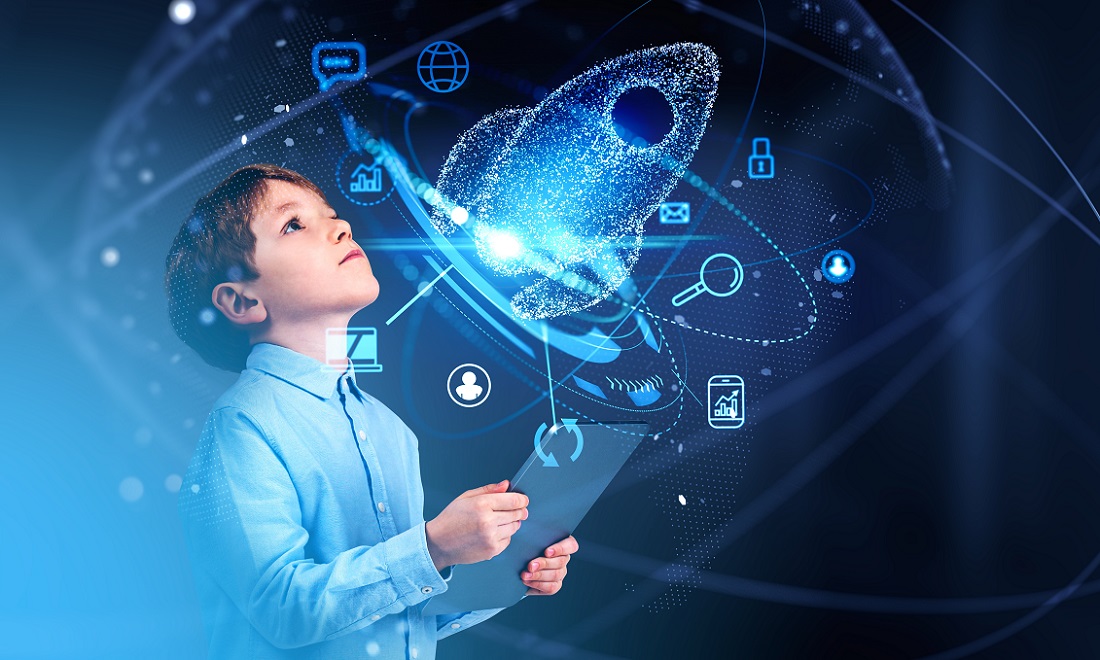Written by: Claudia Garcia

The world of education is evolving rapidly, and 2025 is shaping up to be an exciting year for technological advancements in the classroom. From innovative tools that enhance engagement to solutions that make learning more accessible, educational technology (EdTech) continues to transform how teachers teach and students learn. Here are the top EdTech trends you should keep an eye on in 2025.
1. Artificial Intelligence (AI) in Personalized Learning
AI is no longer a futuristic concept—it’s a reality that’s reshaping education. In 2025, AI-powered tools are becoming increasingly sophisticated, allowing teachers to personalize lessons based on each student’s learning pace, style, and needs. AI can provide instant feedback on assignments, track progress, and even predict areas where students may need extra support. For teachers, this means more time to focus on one-on-one interactions while the technology handles routine tasks.
Example Tools:
- Adaptive learning platforms like DreamBox and ALEKS.
- AI-driven grading systems that save educators hours of manual work.
2. Gamification of Education
Gamification—the use of game-like elements in non-gaming contexts—is set to become even more prevalent in 2025. By incorporating points, badges, and leaderboards into lessons, teachers can boost student engagement and motivation. Gamification makes learning fun and interactive, encouraging students to stay involved and achieve their goals.
Benefits:
- Increased student participation.
- Improved retention of information through interactive experiences.
- Encouragement of healthy competition and collaboration.
3. Immersive Learning with Virtual and Augmented Reality (VR/AR)
Virtual and Augmented Reality are revolutionizing how students experience education. In 2025, these technologies are becoming more affordable and accessible, allowing students to explore virtual environments, conduct virtual lab experiments, and even visit historical sites from their classrooms. These immersive experiences make abstract concepts tangible and help students grasp complex ideas more effectively.
Use Cases:
- Virtual science labs where students can experiment without physical constraints.
- AR apps that overlay historical landmarks with real-time information.
4. Increased Focus on Digital Literacy
As the digital world continues to expand, teaching digital literacy is more critical than ever. In 2025, schools are prioritizing lessons on cybersecurity, responsible social media use, and critical evaluation of online information. These skills are essential not only for academic success but also for navigating the professional world.
Topics Covered:
- Understanding online privacy and security.
- Identifying reliable sources of information.
- Building a positive digital footprint.
5. Data-Driven Decision-Making in Education
Big Data is becoming a key player in education, providing insights that help teachers and administrators make informed decisions. By analyzing student performance data, educators can identify trends, measure the effectiveness of teaching strategies, and tailor their methods to meet students’ needs. In 2025, expect data to play a more significant role in shaping curriculums and improving student outcomes.
Practical Applications:
- Identifying at-risk students early on.
- Adjusting lesson plans based on data insights.
- Measuring the success of different teaching approaches.
6. Collaboration Tools for Remote and Hybrid Learning
While the pandemic may feel like a thing of the past, the lessons learned from remote and hybrid learning continue to shape education. In 2025, collaboration tools are more advanced, enabling seamless communication and teamwork among students and teachers, no matter where they are. Features like real-time document editing, virtual whiteboards, and video conferencing ensure that learning remains interactive and effective.
Popular Tools:
- Platforms like Google Workspace and Microsoft Teams for Education.
- Virtual collaboration apps like Miro and Jamboard.
7. Sustainability in EdTech
As global awareness of environmental issues grows, sustainability is becoming a focus in EdTech. In 2025, schools and institutions are adopting greener practices, such as using energy-efficient devices and digital tools that reduce the need for paper. EdTech companies are also innovating to create sustainable products that align with eco-friendly goals.
The EdTech trends of 2025 promise to make education more personalized, engaging, and accessible. From AI-driven solutions to immersive learning experiences, these technologies are empowering teachers to innovate and students to thrive. However, the success of these tools lies in their thoughtful implementation and the commitment to putting students’ needs first.
At Papaya Tutor, we’re proud to be part of this transformation. Our platform embraces many of these trends, including personalized learning, gamification, and the use of data to improve outcomes. If you’re ready to experience how modern technology can enhance education, we invite you to join us. Let’s work together to help students achieve their full potential—one class at a time.
Sign up for a free trial class today!
For further information, please contact us here.